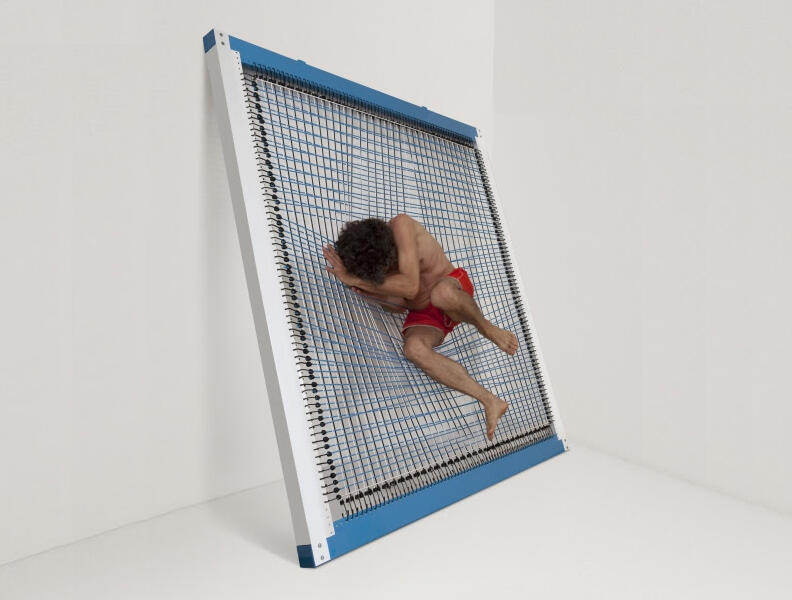Galeria Luisa Strina presents Homo Ludens
Homo Ludens is a group show curated by Ricardo Sardenberg open from 31 August until 5 November at Galeria Luisa Strina, Brasil.

This text must be read as a complement to the exhibition Homo Ludens, held at Galeria Luisa Strina from August 31st to November 5th, 2016. I say ‘complement’ because it is one among the many gestures required to reach the exhibition’s final result. Actually, the exhibition’s text is the exhibition itself and, for this very reason, it doesn’t work as a theoretical explanation of what goes on the exhibition rooms. The works presented are both metaphorical and poetic tags of plastic visuality, and can only be read in person while visiting the space – considering the exhibition can accomplish its ludic potential. In other words: the exhibition’s concept can only be reached once the encounter of all the works take place in the space at stake.
Just as in other exhibitions curated by me (i.e., Noite azul elétrico, Tara por livros, On another scale, and Cordão dos mentecaptos)*, Homo Ludens derives from an idea that somehow concerns my relation with the world. In a time so mediated by technology, it seems to me that we are getting farther and farther from what is essential and what ensures our humanity, such as the act of making a pause and feeling the smell of wet grass or even observing species of birds that live in our cities or just pass by visiting throughout the year. For this exhibition, my original idea was to deal with the concept of game, being attracted rather by the process of inviting artists to collaborate than any other theoretical definition of the theme.
One day, while playing racquetball at the beach, I realized that are several dimensions of games. In this specific one, you don’t play against someone, but rather along with someone. The other, in this case, is not an opponent, and the rules, on their turn, aren’t much defined. There is no such thing as the perfect move – a spike and a dig play equal parts –, and the real pleasure lays on keeping the ball on the air, in perpetual motion. To use the contemporary curatorial jargon: in this instance, there is no preconceived scope, strategy or concept. Thinking about racquetball and the absence of competition in it, I ended up understanding what ludic is and the idea of playing, which interested me in the first place.
The themes then flowed naturally: death, the child universe, the capitalist means of production, war, illusionism, strategy, fantasy, art history. Although, in this case, nothing sets itself steadily nor intends to apprehend keys to understand the exhibition. The dialogue with the artists and the poetic suggestions the works brought me are distributed on the exhibition gameboard so that their relations come up while living together, given that the confrontation is the game itself.
Before being conceived, the exhibition must be experimented and contemplated. If such boldness is tolerated, I suggest the visitor to make an effort so that the experience can precede rationalization. Ideally, the visitor must become a spectator to the ‘racquetball game’ that already exists among the objects positioned on the space, for then figuring out what are the singled out cards on the exhibition’s gameboard.
The original idea is a sort of magnet attracting all the displayed works to the same context. Once in the space, a web of relations makes them waive their autonomy as artworks in order to jointly take part of this ludic proposition hic et nunc.
Homo ludens is a term borrowed from the homonymous book by Dutch historian Johan Huizinga. Yet, the exhibition doesn’t reveal itself as a research ensuing from the concepts developed by him, but rather as a poem inspired by the historian’s original proposition. After all, it is proper to the Homo ludens to play within a cultural structure with determined rules, highlighting the ludic aspect of life.
The Homo ludens goes back to the cave and suggests the contemporary artist as some sort of super-mediated cave painter. Our gestures and dances are so important as what we think and build while producing something. It is good – and beautiful – to make a pause and contemplate the fact that we are all Homo sapiens, Homo faber and Homo ludens.
Participating artists: Bas Jan Ader, José Bento, Pedro Caetano, Waltércio Caldas, Alexander Calder, Tiago Carneiro da Cunha, Alex Cerveny, Wesley Duke Lee, Marcius Galan, Fernanda Gomes, Agnieszka Kurant, Guto Lacaz, Nelson Leirner, Leonilson, Jarbas Lopes, Jorge Macchi, Montez Magno, Marepe, Cildo Meireles, Rivane Neuenschwander, Pedro Reyes, Dieter Roth, Beto Shwafaty, Erika Verzutti, among others.
Exhibition dates: 31 August to 5 November, 2016.
Gallery hours: Monday to Friday from 10 a.m. to 7 p.m. / Saturdays from 10 a.m. to 5 p.m.


